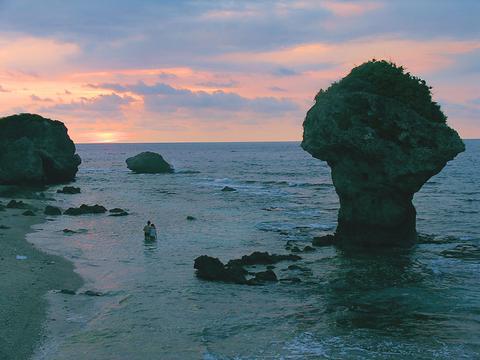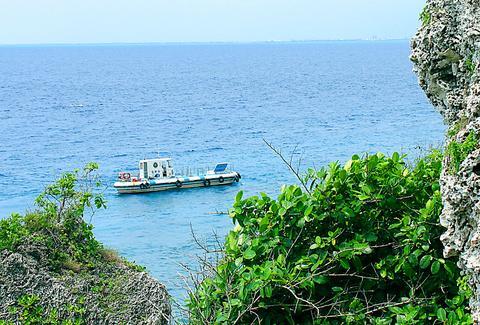Few of Taiwan's tourist destinations have the natural assets of Hsiao Liuchiu, (
A quick ride around the island reveals why: nearly every plot of "undeveloped" land has been taken up by graves. What's more, the nicer the plot -- with, say, a postcard view of the setting sun -- the more graves there are.
Liuchiu, as residents call it, is just 6.8km2 with a population of some 13,000 residing in eight villages. With just 10 surnames between them, they are keenly aware of just whose graves occupy their backyards. Most residents live on the northern side of the island near the harbor closest to Kaohsiung. The southern half of Liuchiu is mostly graves, interrupted by either an occasional village or one of the giant coral rock formations of which the island is composed.

PHOTO: DAVID MOMPHARD, TAIPEI TIMES
The living and dead so closely cohabitate the island that it is, in fact, against the law. Regulations established by the Ministry of the Interior state that burials cannot take place within 500m of a residence. But on an island that is just 4,000m long and 2,000m across, obeying this law would be next to impossible.
"Liuchiu has two problems," said Chen Chen-hua (陳振華), who operates a seaside resort and campground, the island's newest tourist development, "All the young people go over there," he says pointing to Kaohsiung on the horizon, "and all the old people go over there," he says pointing to the south of the island.
Chen explains that the young people leave mostly for better job opportunities on Taiwan, but also to escape an island famous for its ghosts.

PHOTO: DAVID MOMPHARD, TAIPEI TIMES
One of the main tourist attractions on Liuchiu is Black Spirit Cave (烏鬼洞), a sea-side park area made famous for its picturesque scenery and the story of what happened there centuries ago.
The story is carved in stone near the cave's entrance: "It was in 1661 (the 15th year of the Yong Li Ming Dynasty) national hero Koxinga (Cheng Chen-kung, 鄭成功), knighted as Yen Ping King, drove the Dutch and restored Taiwan and the Pescadores (Penghu). During the Dutch escaping, some negroes were separated from their unit and arrived at this island. They lived in this cave. Some years later, a British boat with soldiers landed at the place northeast of the cave. As they were enjoying the scenery, those negroes robbed their food and other things, burned the boat and killed all the British. It was discovered by the British warship that they landed this island and sought the murderers while the negroes hid in the cave. In spite of many threats, they refused to surrender. Finally, the British burned the cave with oil. Then, all the negroes died there in the cave. Later it was named as the Black Spirit Cave, which means the cave in which the foreign negroes had lived before. ...."
The inscription ends with a nod to Liuchiu's tourism ambitions: "To add more beauty for this island and to meet the development of tourism, we rebuilt it in the form of public building and made it more enjoyable."
Scholars now believe that the "negroes" in the story were actually Siraya Aborigines, who were related to tribes that lived in the area that is now Pingtung County as far back as 3,000 years ago.
Another of the island's main attractions is Beauty Cave (美人洞), named for the young daughter of a Ming loyalist who fled China to escape Manchu forces. He and his daughter hid out in this catacomb of coral grottoes, surviving off wild plants and fish until the day the father died. Local inhabitants later discovered the young girl weeping over her father's body. But rather than leave his side, according to the legend, she bit her tongue in half and took her own life.
The most remote of these grottoes is, yet again, famous for a tragic reason. It was the sight where, in the last century, locals disposed of unwanted baby girls. It's now marked by a shrine built in the girls' honor.
But ghost stories and tragic tales are hard to think of when the sun kisses the coral shores of Liuchiu and winks from the tops of waves. At the island's peak, on a clear day, it's possible to trace Taiwan's coastline from Kaohsiung in the north down the Hengchun Peninsula in the south. The living coral beneath the sea and the coral rock inland on the island mean adventure-seekers could spend several days getting happily lost. The beauty of Liuchiu is as beguiling as its ghost stories.

On April 26, The Lancet published a letter from two doctors at Taichung-based China Medical University Hospital (CMUH) warning that “Taiwan’s Health Care System is on the Brink of Collapse.” The authors said that “Years of policy inaction and mismanagement of resources have led to the National Health Insurance system operating under unsustainable conditions.” The pushback was immediate. Errors in the paper were quickly identified and publicized, to discredit the authors (the hospital apologized). CNA reported that CMUH said the letter described Taiwan in 2021 as having 62 nurses per 10,000 people, when the correct number was 78 nurses per 10,000

As we live longer, our risk of cognitive impairment is increasing. How can we delay the onset of symptoms? Do we have to give up every indulgence or can small changes make a difference? We asked neurologists for tips on how to keep our brains healthy for life. TAKE CARE OF YOUR HEALTH “All of the sensible things that apply to bodily health apply to brain health,” says Suzanne O’Sullivan, a consultant in neurology at the National Hospital for Neurology and Neurosurgery in London, and the author of The Age of Diagnosis. “When you’re 20, you can get away with absolute

May 5 to May 11 What started out as friction between Taiwanese students at Taichung First High School and a Japanese head cook escalated dramatically over the first two weeks of May 1927. It began on April 30 when the cook’s wife knew that lotus starch used in that night’s dinner had rat feces in it, but failed to inform staff until the meal was already prepared. The students believed that her silence was intentional, and filed a complaint. The school’s Japanese administrators sided with the cook’s family, dismissing the students as troublemakers and clamping down on their freedoms — with

As Donald Trump’s executive order in March led to the shuttering of Voice of America (VOA) — the global broadcaster whose roots date back to the fight against Nazi propaganda — he quickly attracted support from figures not used to aligning themselves with any US administration. Trump had ordered the US Agency for Global Media, the federal agency that funds VOA and other groups promoting independent journalism overseas, to be “eliminated to the maximum extent consistent with applicable law.” The decision suddenly halted programming in 49 languages to more than 425 million people. In Moscow, Margarita Simonyan, the hardline editor-in-chief of the